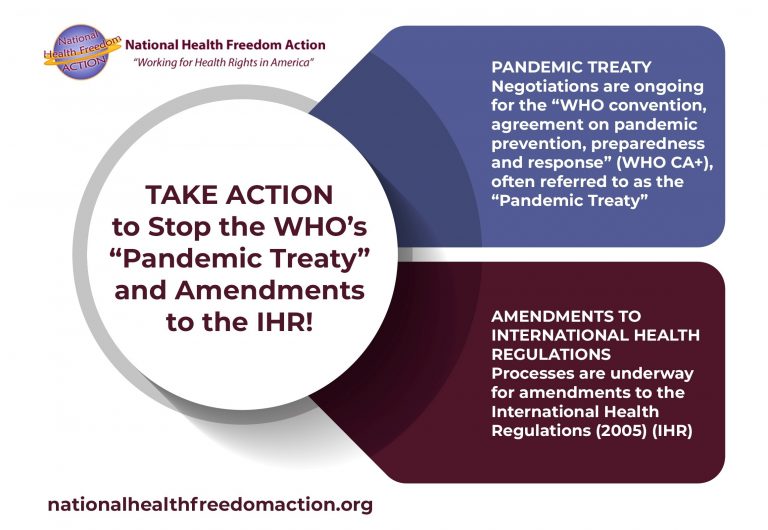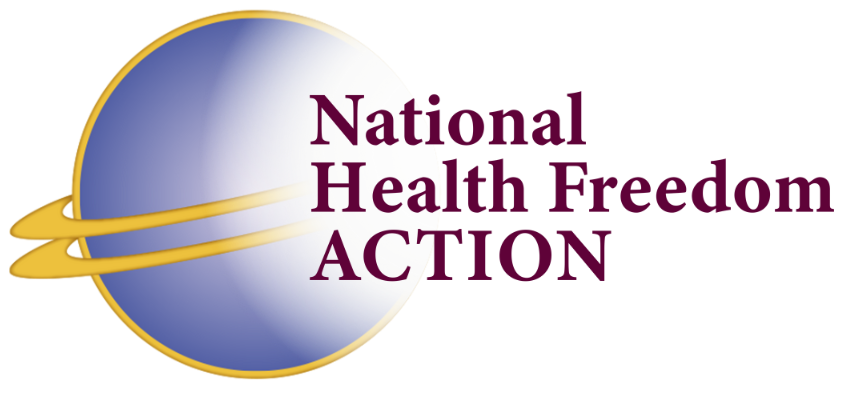
NO LONGER ACTIVE

NO LONGER ACTIVE
SB444 referred to Committee on Foreign Relations – Died in Comittee
HR 1425 passed in the House, referred to the Senate and died in Committee on Foreign Relations
The US has noticed its intention to withdraw from the WHO
The World Health Organization is on a two-track process that would erode both US sovereignty and our health freedom—Help stop the WHO CA+ agreement and the Amendments to IHR.
Two-Track Process Impacting Health Freedom
There has been much in the news about the World Health Organization’s proposed changes to international health law and policy. It’s been a bit confusing, as there are two WHO health-related processes in the works:
First, the US is a member state of the World Health Assembly, the governing body of the World Health Organization. Negotiations are now taking place for the “WHO convention, agreement or other international instrument on pandemic prevention, preparedness and response” (WHO CA+), often referred to as the “Pandemic Treaty.” The US Constitution requires approval by the Senate before the US agrees to a treaty. However, this initiative is not a treaty, but rather a WHO committee endeavor by member states. The committee has met four times thus far and has proposed a draft agreement:
Per WHO: In recognition of the catastrophic failure of the international community in showing solidarity and equity in response to the coronavirus disease (COVID-19) pandemic, the World Health Assembly convened a second special session in December 2021, where it established an Intergovernmental Negotiating Body (INB) open to all Member States and Associate Members (and regional economic integration organizations as appropriate) to draft and negotiate a WHO convention, agreement or other international instrument on pandemic prevention, preparedness and response, with a view to its adoption under Article 19, or under other provisions of the WHO Constitution as may be deemed appropriate by the INB.
Next, similar processes are underway for amendments to the already existing International Health Regulations (2005) (IHR), a WHO agreement between its 194 member nations. The IHR includes appendixes, attached by member countries including the US, that allow them to resist compliance with the Regulations and protect sovereignty. (See IHR, Appendix 2, US portion.) Despite this, the IHR proposed amendments could impact many health freedom issues if not carefully scrutinized. And they also may impair member nations’ independence and their ability to set their own public health policies. Meetings on the IHR are scheduled for April 17-20, 2023; WHO’s current stated goal is to have both processes complete by May 2024, but this date could be advanced to 2023.
International Health Regulations (2005)
Top Ten Reasons to Oppose the Proposed Amendments to the International Health Regulations, compiled by researcher and activist James Roguski:
Changes WHO from advisory group that makes recommendations to a governing body whose proclamations would be legally binding. (Article 1 and Article 42)
Expands scope of IHR Regulations from actual to potential emergencies that have a “potential to impact public health.” (Article 2)
Removes clause calling for “respect for dignity, human rights and fundamental freedoms of people.” (Article 3)
Allows WHO Director General to take control of the means of production via an “allocation plan for health products.” (Article 13A)
Gives WHO authority to require exams, proof of prophylaxis and vaccination, and contact tracing, quarantine, and treatment. (Article 18)
Institutes “Global Health Certificates” in digital or paper form, to include records of testing, vaccination, prophylaxis, and recovery, as well as passenger tracking/tracing. (Articles 18, 23, 24, 27, 28, 31, 36, 44, and Annexes 6 and 8)
Empowers Emergency Committee to override decisions by sovereign nations regarding health measures.
Redirects unspecified billions of dollars to the Medical-Industrial Complex with no accountability. (Article 44A)
Greatly expands WHO’s ability to censor what they consider misinformation or disinformation. (Annex 1, page 36.)
Creates obligation to build, provide, and maintain IHR infrastructure at national points of entry. (Annex 10)
WHO CA+ Should be Considered a “Treaty”
WHO CA+ is another initiative that threatens our health freedom. Wisconsin’s Senator Ron Johnson has introduced SB444, the “No WHO Pandemic Preparedness Treaty Without Senate Approval Act.” House Resolution 1425 similarly calls for Senate approval of any WHO+ agreement. According to Senator Johnson, this bill would mandate that any WHO convention or agreement be deemed a treaty, “requiring the advice and consent of a supermajority of the Senate.” Johnson notes that the WHO has mismanaged the COVID-19 pandemic, and that “Americans remain skeptical of continuing infringements on personal liberties and freedoms. The legislation would provide more transparency in WHO agreements and a constitutional check on the administration.” See here for the top ten reasons to oppose this agreement.
WHO Failed Miserably in COVID-19 Response?
“The WHO, along with our federal health agencies, failed miserably in their response to COVID-19. This failure should not be rewarded with a new international treaty that would increase the WHO’s power at the expense of American sovereignty,” offered Senator Johnson. He added, “I’m proud to reintroduce this legislation to hold the WHO accountable for their failures and increase transparency for the American people. The sovereignty of the United States is not negotiable.”
TAKE ACTION NOW and contact your US Senators and Representative: Let them know that you oppose both the proposed Amendments to the IHR and the WHO CA+ and that you support SB444 along with HR1425.
MORE ACTION ALERTS


Help Oppose Massachusetts SB 905 and SB 907
November 22, 2017

WI: Act Now to Protect Consumer Access to Natural Health Practitioners!
November 17, 2017

